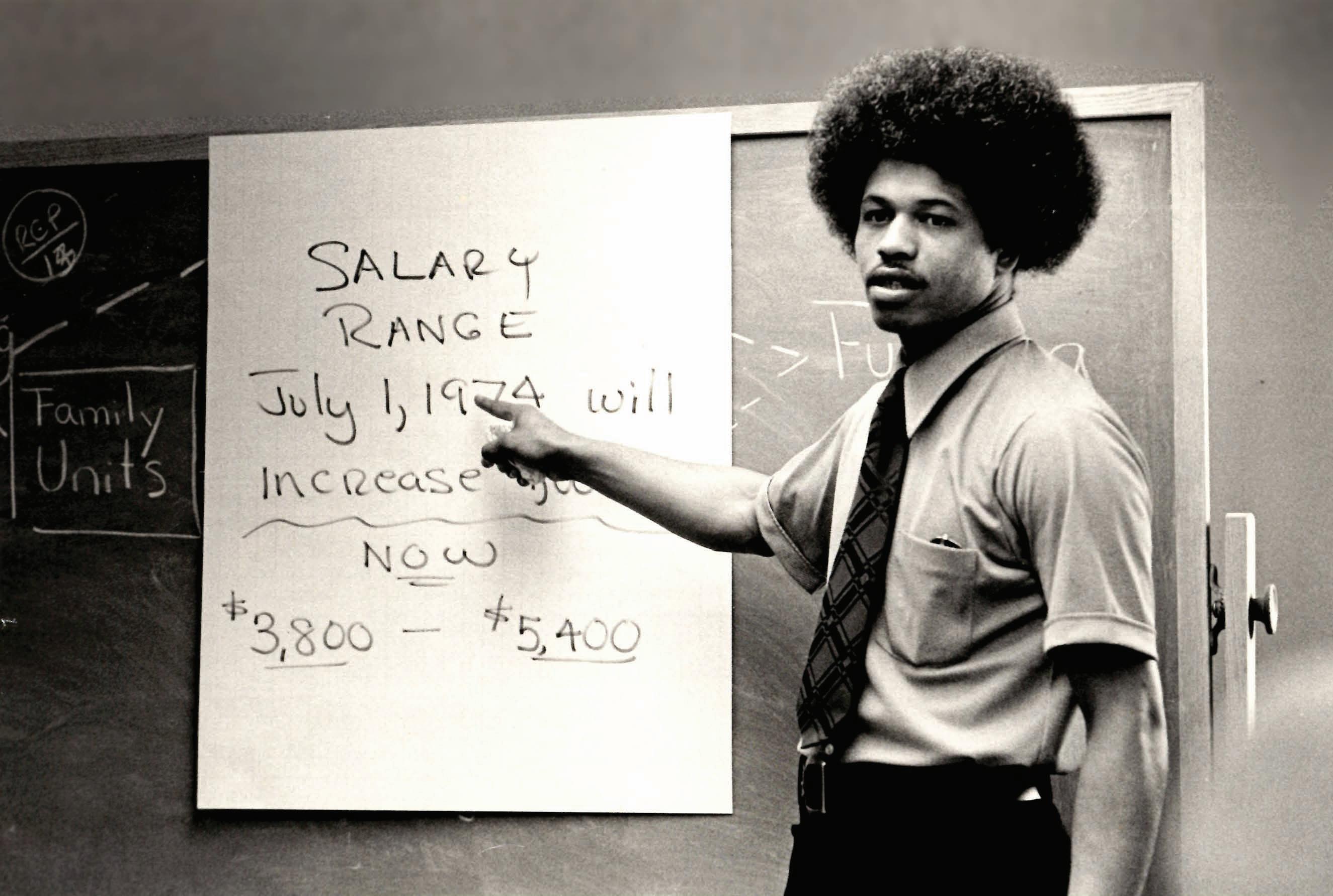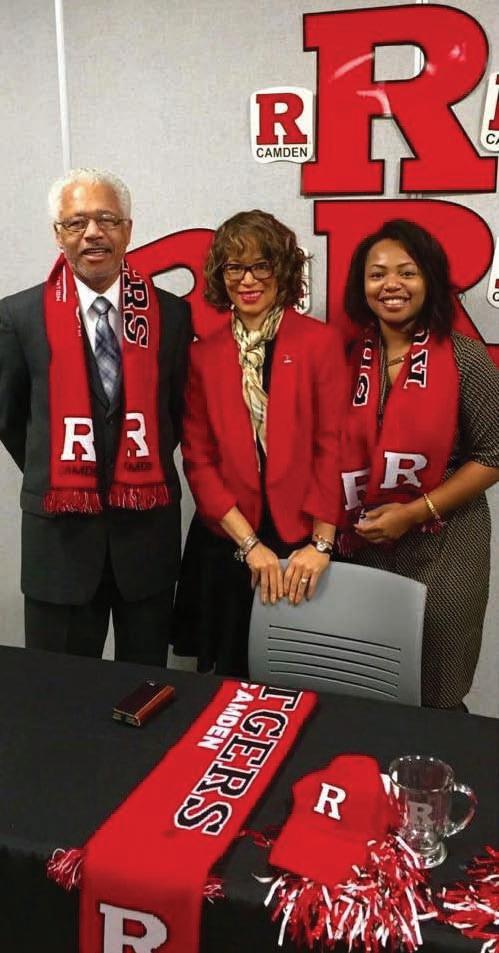
7 minute read
Living Legacies

Seated in the front row: Theodore Blunt with Marla sitting on his lap trying to get her mother, Alice's attention. Also seated are Theodore's daughters Thea and Lisa.
By: Melissa Kvidahl Reilly
Though prevailing social challenges shift, one thing perseveres: year after year, this family - and social workers everywhere - remains dedicated to service.
Theodore Blunt graduated from the School of Social Work in the late 1960s. About 35 years later, his daughter Marla Blunt-Carter followed in his footsteps. And 10 years after that, so did his granddaughter and Marla’s niece, Alyssa Bradley. Here, these three generations weigh in on why they decided on social work, the influence of family, and what it means to be Generations Strong.

Ted Blunt giving a presentation to public housing residents about salary ranges for various jobs.
First Generation: Theodore Blunt, MSW'68
Theodore Blunt has always been driven by a passion for helping others, so when he had the opportunity to attend the School of Social Work to earn a master’s degree, he committed to routinely taking two buses, a subway, and a car from Philadelphia to class in New Brunswick and back — all in, a three hour commute each way — to make it happen. His illustrious career spanned the housing authority, a local school district, and public office in Wilmington, Delaware, where he served on the city council for 16 years and as its president for an additional eight years until his retirement in 2008.
Why social work: I believed I had an ability to connect and communicate with people, especially those I was hoping to serve who were less fortunate than others. I grew up in public housing, I had a public education, and we received public assistance. I felt I could do a better job conveying a positive message to these people.
On campus in the 1960s: When I started at Rutgers in 1966, the name Paul Robeson had just started coming back to campus. For a long time, his name was missing from the university. There was no mention of him. This was a large issue, especially for minorities: What happened to Paul Robeson, the school’s greatest scholar and athlete?
On his influence: I don’t know whether I influenced my granddaughter and daughter, but I do know that you can sometimes become what you see. And if you see people doing good for other people, you inherently do good for other people. My job and life experiences have always taught me to do the best I could for everyone else as well as my family. My daughter saw me working in the field of social work. She saw me involved in the community, not on the sidelines, but willing to get into the ring and fight the battle.
His message for today’s social workers: Social workers, now more than ever before, need to be engaged in politics and understand the value of being connected to politics. Historically, that was a forbidden thing to do. But we need to be out in front instead of in the background, proposing what can be beneficial to the community at large, and not just saying it but doing something about it. Because from politics, we create public policy and that creates law..
What Generations Strong means to him: I think it means passing along things that could be beneficial to the next generation, and figuring out how you can implement those things to make life better for everyone else.

Marla Blunt-Carter with her mentors.
Second Generation: Marla Blunt-Carter, MSW'03
Marla Blunt-Carter is assistant professor of professional practice at the School of Social Work, where she teaches graduate courses on macro social work practice, management, and policy. Twice named Professor of the Year, Marla teaches seven courses annually on the Rutgers University–Camden campus.
On her father’s influence: He was very much a part of my life decisions. In fact, I went to his undergraduate and graduate school alma maters, so I’ve been following in his footsteps for quite a while. He was always helping people and would always include my sisters and me in everything he did. If he was running a program, we were there. If he was running for office, we were dropping off literature and going to rallies. I got to see what his work meant to so many people. And I wanted to be like him.
He often shared with us his trials growing up with a single mom raising four kids in North Philly, being the first in his family to go to college, and being married and having three kids while in graduate school. He worked hard to succeed academically and people would ask, why would you do all of that for a social work degree? Dad answered that he did it because he wanted to help people. I wanted to be like that. I wanted to be someone who helped other people.
On her “ah-ha” moment: I couldn't finish my last undergraduate semester at Winston-Salem State University in 1988 due to stressors surrounding academic pressures, serving as the SGA president, and being an outspoken political science student activist. I was overwhelmed and left school without having a clear career path.
I became a flight attendant, and it was on a flight in 1992 that I met renowned poet and author Maya Angelou. She sat and recited her poems for me and the other flight attendants as we crowded around her in the first class cabin. She inspired all of us with her wisdom and as the other flight attendants returned to doing service, I remained by her side. I was in awe of her brilliance and her grace, and then she reached her hand out to me and said, “What are you doing here? Your light is too bright, my dear. You should not be here. You should be doing something else.” Those words changed my life. I immediately got off the plane, called Winston-Salem State and said, “Please tell me how to transfer my credits to the University of Delaware, I need to finish my degree and fulfill my purpose.”
That was the beginning for me: someone saying do the work you know you were called to do. That’s the thing about social work – we know it’s in us. Many of us run from it because of the public perception that it's not glamorous or doesn’t pay, but we end up right back here, at home.
On campus in the 2000s: I was taking classes and still working as a flight attendant when 9/11 happened. Everything changed for my coworkers, the traveling public, and the American people. I was consumed with the health, welfare, and safety of my fellow flight attendants, both in the air and in life off of the plane. I also had many airline friends affected and infected by HIV in the 1990s.
Both 9/11 and the AIDS epidemic were discussed in our classes and in the stories my classmates shared from their field placements. We didn’t use the term “trauma informed care” at that time, but that’s what we were doing. We were learning how to help people make sense of what did not make sense, and show them how to manage during uncertain times.
What Generations Strong means to her: I think it speaks to the fact that social work has been around for generations, and it is as strong and necessary today as it was in the days of Jane Addams. Social ills still exist and we are still needed.

Theodore, Marla and Alyssa.
Third Generation: Alyssa Bradley, MSW'12
With a professional history in rehab counseling and disability training, Alyssa Bradley is currently program manager at Year Up, a workforce development program for young adults.
On her family’s influence: They absolutely had an influence on me. My family is a family of service. And I knew I wanted to help people. So I talked to my aunt and grandfather and explored what they did, and they shared how social work can open up so many opportunities to help people on a micro and macro level.
After graduation, my aunt invited me back to speak to one of her classes and it was really rewarding. It showed me that she thought I had something to contribute. To be able to share and speak to the students, and see how proud she was of me, gave me more confidence in my ability to do my work.
On campus in the 2010s One of the big issues at that time, and which is still an issue, was the opioid epidemic. Right after I graduated, I was a drug and alcohol counselor at a methadone clinic. I made the shift to young adults because I felt I wasn’t getting to people soon enough and by the time I did work with them, there were so many patterns already in place that meeting with me once every week or every two weeks wasn’t enough to really help them. I wanted a job focused on the younger population, to perhaps head off this issue before those patterns were in place.
What Generations Strong means to her: What comes to mind, especially when I think of my family, is a legacy of public service continuing with intentionality, passion, and perseverance.


